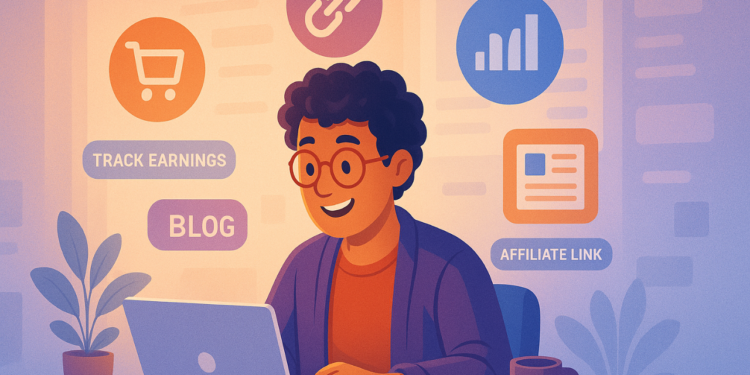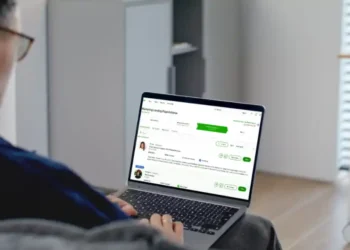Feeling Lost About Affiliate Marketing for Blogs? Let’s Break It Down
If you’re a blogger trying to figure out how to earn money without turning your blog into a giant ad space, affiliate marketing might just be your new best friend. I remember when I first heard about it “You can earn money by recommending products you already love?” It sounded too good to be true. But over time, I realized affiliate marketing for blogs is not just real it can be powerful and ethical when done right.
In this post, I’ll Walk you through what affiliate marketing actually is, how to start it even if you’re a total beginner, and how to make it feel authentic (not spammy). Whether you run a mental health blog, a wellness site, or just share personal growth tips you’ll learn how to start earning in a way that aligns with your values and supports your readers.
1. What is Affiliate Marketing for Blogs?
Let’s keep it simple: affiliate marketing is when you recommend a product or service on your blog, and if someone buys it through your special link, you earn a small commission. That’s it.
For example, I once wrote a post about my favorite journaling tools. I added links to the notebook and pens I actually use and love. When readers clicked and bought them, I earned a few dollars without them paying anything extra.
It’s like getting rewarded for sharing things you genuinely like. No pushy sales tactics needed. Just your honest voice.
See More: Best Blogging Platforms to Start in 2025 (Beginner-Friendly)
This makes it a perfect income stream for mental health and wellness bloggers who value trust, honesty, and meaningful content.
2. Choose Products That Truly Align with Your Blog
Here’s the deal doesn’t just promote whatever pays the most. Readers can tell when it’s not authentic.
Stick to products you’ve used or would genuinely recommend to a friend. For instance, on my mental health blog, I only share books, meditation apps, or wellness tools that I’ve personally found helpful.
Ask yourself:
Would I use this myself?
Does it support the message of my blog?
Would my readers benefit from it?
When your recommendations feel natural, readers will trust you and be more likely to click and buy.
3. Join Affiliate Programs That Fit Your Niche
You don’t need to be a marketing expert to find affiliate programs. Many popular tools and platforms have them, even ones you already use.
Here are a few beginner-friendly ones:
Amazon Associates – easy to start, huge product variety
ShareASale – offers wellness and mental health-friendly brands
ConvertKit & Canva – great for content creators
Audible – perfect for self-help and mental wellness blogs
Etsy – for mental health journals, art, and self-care gifts
You usually just sign up, get approved, and start sharing links. Easy!
4. Write Helpful Content, Not Sales Pitches
People are searching for solutions not product ads. So, write blog posts that help your readers, and naturally mention your affiliate links where they fit.
For example:
“10 Journaling Prompts for Anxiety” and link to your favorite notebook
“How I Created a Self-Care Routine” – include links to items you use (e.g. essential oils, planners)
One thing I tried was writing a personal story about struggling with sleep, and I shared the meditation app that helped me. It wasn’t salesy it was real. And that’s what connected with readers.
See More: What is Affiliate Marketing and How to Learn It?
5. Add Disclaimers (It’s About Trust, Not Legalese)
Affiliate marketing for blogs also means being transparent. You must let your readers know you’re using affiliate links but don’t worry, it doesn’t have to be awkward.
I usually say something like:
“This post contains affiliate links, which means I may earn a small commission if you buy through them at no extra cost to you. I only recommend what I truly love!”
This builds trust and keeps things honest, which matters especially in the mental health space.
6. Use Affiliate Links Naturally in Your Posts
The key is to blend your links naturally into your content. No one wants to be bombarded with a wall of links. Instead, share links like you would if you were texting a friend.
Example:
“I’ve been using this guided meditation app every night before bed, and it really helps me unwind.”
Keep it conversational, personal, and relevant. Your blog stays valuable, and your readers don’t feel sold to.
7. Track What’s Working and Learn from It
Most affiliate programs give you a dashboard where you can see how many people clicked and how many purchased. This isn’t just fun to watch—it helps you learn what your readers like.
If a certain product isn’t getting clicks? Maybe it’s not resonating.
If one post gets lots of conversions? You might write more like that.
I check my affiliate stats about once a week to stay informed, not obsessed. It’s just like checking in with a journal see what’s working and what’s not.
8. Start Small and Be Patient
Affiliate marketing for blogs isn’t a get-rich-quick thing. Especially in niches like mental health, it takes time to build trust and an audience.
I didn’t earn a cent in my first month. But after consistently writing helpful content and sharing honest recommendations, the clicks (and commissions) slowly started coming in.
Just start. You’ll get better, and your blog will grow with you.
9. Create a Resources or “Favorites” Page
This is one of my favorite tips: make a simple “Resources” or “Things I Love” page on your blog. It’s a great way to collect all your recommended tools in one place.
Include:
Books you recommend
Apps you use
Wellness products you love
Courses or workshops you’ve taken
I’ve had readers message me just to thank me for that page they love having everything in one spot.
10. Keep Showing Up with Value First
At the end of the day, affiliate marketing works best when your blog is full of genuine value. Keep helping your readers. Keep writing from the heart. Share what’s helped you.
That’s what makes people come back and eventually trust your recommendations.
Conclusion: You Can Start Earning Without Selling Your Soul
Affiliate marketing for blogs doesn’t mean turning your blog into a commercial. It means sharing things you love, helping your readers, and earning a little in return. That’s a win-win. You don’t need to have everything perfect. Just start with one post, one link, one story. You’ll learn, grow, and earn along the way. Your blog is more than just a hobby it’s a platform that can empower you and support others. And that’s worth building.
Leave a comment or share this post with a friend starting their blog!
FAQs
1. Is affiliate marketing for blogs legal and safe?
Yes, it’s completely legal! You just need to be honest with your readers. Always disclose that you’re using affiliate links. Most affiliate programs have rules about this too. And as long as you’re promoting things you believe in, there’s no reason to feel weird about it it’s just another way to keep your blog going strong.
2. How do I get people to click my affiliate links?
Write helpful content that answers real problems. Don’t force links place them naturally where they make sense. Think like a friend giving advice, not a salesperson. If your blog post is useful and your recommendations are honest, clicks will come over time. Patience + value = results.
3. Can I do affiliate marketing even with low traffic?
Absolutely. You don’t need thousands of views to start. In fact, smaller blogs often have higher trust with their readers. Focus on creating quality content and building relationships. Even a few clicks can lead to earnings and those can grow with time.
















Discussion about this post